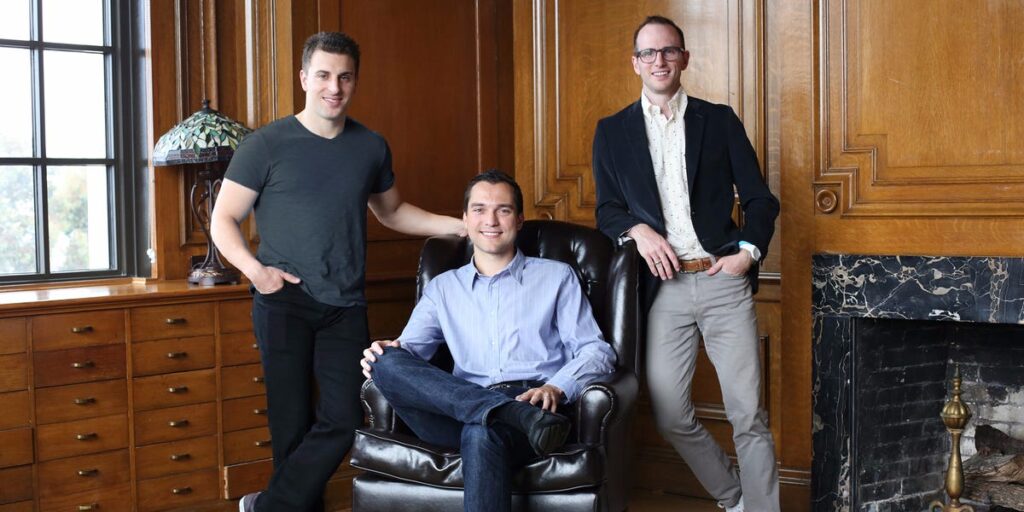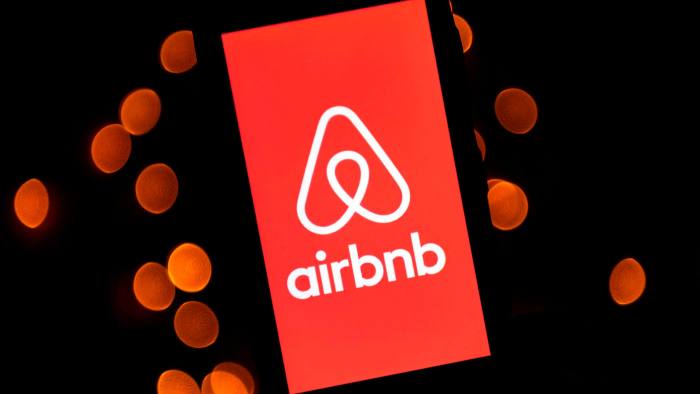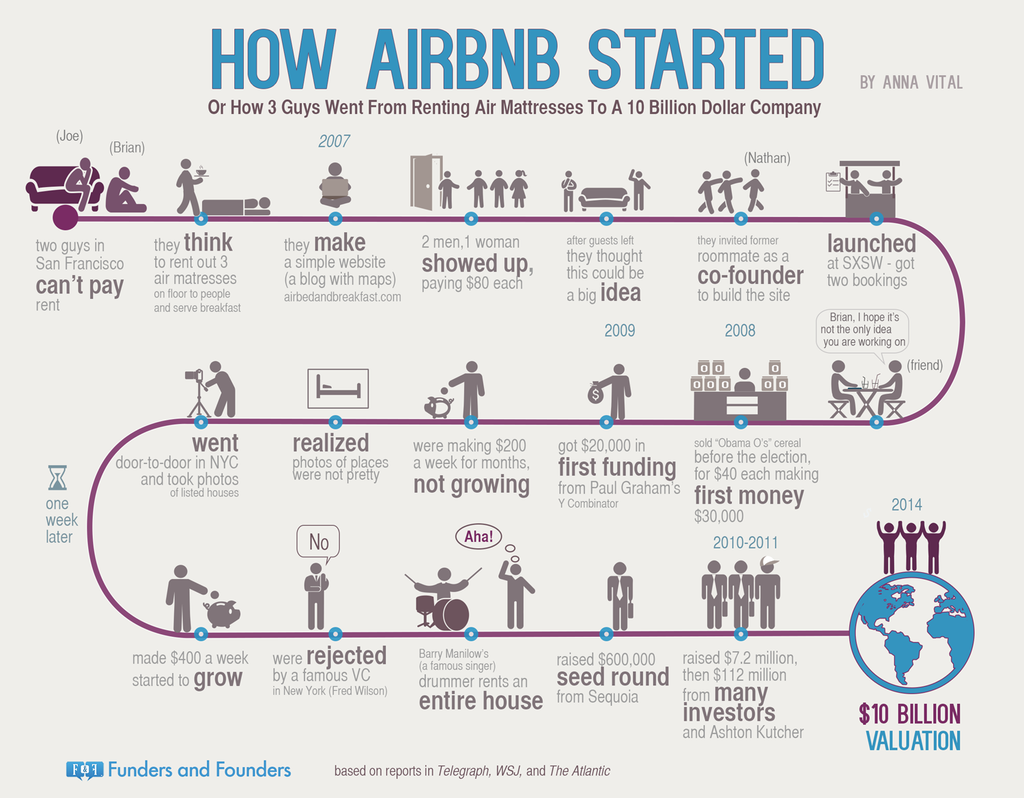Airbnb is more than an online platform used to find accommodation. It represents a growing community that is shifting the way people feel about sharing, traveling, and home. Brian Chesky, CEO and co-founder of Airbnb used a communication at Airbnb’s blog to state that Airbnb is “creating a door to an open world—where everyone’s at home and can belong, anywhere.”. More than a travel experience for its guests, Airbnb also plays an important role for its hosts, allowing them to attain a new source of income by opening their homes and sharing their expertise
History of Airbnb
Founded in August 2008 by Joe Gebbia, Brian Chesky, and Nate Blecharckzy, Airbnb Inc. represents the emergence of new business models in a nonexistent market.

Airbnb Inc. was first born in October 2007 out of a struggle between two friends to pay their rent. According to an interview given by Brian Chesky to Reid at Standford University, the story begins when the two co-founders, Joe Gebbia and himself, realized that the only asset they had to overcome their financial struggle was the unutilized space at their apartment. Taking advantage of a design conference that would be held in San Francisco and knowing that all hotels were fully booked, Gebbia and Chesky decided to pursue their idea.
For this matter they created airbedandbreakfast.com. Here they offered their unutilized space and provided airbeds and breakfast for the guests. This first trial accommodated just three guests, who paid $80 per night.
The second moment was in 2008 when Nate Blecharczky joined the team. This time called Airbed and Conferences United States, the idea was for travelers to book airbeds at other people’s houses when they wanted to attend a conference and needed a place to stay. Still, airbeds and conferences were only used to accommodate two customers, one being Brian Chesky himself.
In August 2008 the founders realized that they did not need to limit accommodation to airbeds or conferences. Anyone could be interested in staying at a regular accommodation for a reason that surpassed attending conferences. However, the founders took the advantage of launching for the third time, Airbed & Breakfast for the Democratic National Convention in Denver. Bookings were made at the time of the convention but were not constant.
In a continuous pursuit for success, the business model of having airbeds and breakfast shifted to one of only breakfast. The founders decided to invest in themed cereal, taking advantage of the 2008 US elections. The themed cereal was named Obama ‘O’s and Cap’n’Mcain, constituting a limited edition of cereal, costing $40 a box. This radical shift allowed the founders to return to their initial model by using the revenue attained from the cereal boxes to fund Airbnb.
In 2009 Airbnb joined Y Combinator winter class, a company that funds early-stage startups and helps them prepare their investor’s pitch. Brian Chesky also said at his interview given at Standford University that the reason they were accepted at Y Combinator was due to the fact that they had funded Airbnb by selling limited-edition cereal boxes.
In March 2009, Airbed & Breakfast became Airbnb.
By April 2009, the founders had personally met many of their hosts by being guests at their homes. This initiative helped combine the creation of trust with the dissemination of Airbnb’s culture of building a community and fostering a unique experience. Additionally, the company received a $600,000 investment by Sequoia Capital, which according to Brian Chesky, allowed Airbnb to grow from a market-fit product to a Company.
In 2014, Airbnb was considered the ‘Company of the year‘ by Inc Magazine. According to Burt Helm, senior contributor writer at Inc., Airbnb was disruptive, had built a well-known brand, offered more accommodation than the largest hotel chains in the world, and most importantly, had affected the popular culture with the idea of sharing their homes.
On the 4th of December 2014, Brian Chesky used his Twitter account to communicate that Airbnb had achieved its one-millionth listing.
Now, in 2016 Airbnb has already tripled that number, having more than three million listings and having served over one hundred and fifty million guests.
A company that started in 2007 with three airbeds in a living room in San Francisco, went through three launches and is 13 years later, according to information provided from Airbnb Inc., present in more than 191 countries and 65,000 cities. Airbnb considers itself a trusted community marketplace for people to live a unique travel experience.
Two-sided platform
Two different consumer perspectives must be acquainted when discussing Airbnb. First, one of the hosts who use Airbnb to rent their spaces or provide different services. Secondly, one of the guests who use Airbnb to find a unique travel experience.
Hosts
Starting with the hosts, the process is very simple. They must identify themselves, as well as their listings or services by filling out a description, uploading pictures, and picking the price. To help guests, Airbnb offers a professional photography service free of charge.
According to Nidhi Subbaraman (2011), listings with professional photographs are booked 2.5 times more than those which do not have professional photographs.
Also, hosts must set the availability and house rules for the listing. When booked by a guest, hosts will receive a reservation confirmation message as well as a message from the guest, this allows hosts and guests to communicate online or via app and plan for the guest’s reception. If hosts do not want to allow immediate booking, they will have a deadline of 24 hours to confirm the guest’s reservation.
To ensure hosts feel safe when renting their spaces, Airbnb provides hosts with a one million dollar guarantee to cover for accidental damages as well as a Host Protection Insurance to protect hosts from liabilities in case guests get hurt or cause property damage.
A 24/7 global Trust and Safety team is also available for contact if a host or a guest has an issue. These services bring no additional cost.
Guests
Guests, similar to hosts, must also provide relevant information. They must have a complete profile with personal information and preferentially a profile photo. A complete description facilitates the process between guests and hosts. The more information a host can retrieve, the easier it will be to create a trust relationship with the guest.
To find the ideal experience, guests must select the location and the dates. If searching for accommodation, guests must choose between renting an entire home, a private room, or a shared room. Guests also have the opportunity of selecting different filters to facilitate their research.
Revenue Model
Airbnb generates revenue by charging service fees to hosts and guests when a reservation is confirmed. Hosts are charged 3% of the reservations’ subtotal before fees and taxes, while guests’ fees usually vary between 6-12% according to the reservations subtotal, also before fees and taxes.
Payment is collected when the host accepts the reservation request submitted by the guest, however, the amount is only transferred to the host 24 hours after check-in. Additionally, with the launch of Experiences hosts pay a 20% service fee when an experience is booked. Guests do not pay service fees when booking experiences.
Nevertheless, at Airbnb, guests, and hosts can search and/or list accommodations without being charged. Free membership has quickly allowed the company to attract a great number of visitors without forcing them to contribute financially. For Airbnb, users are charged only when transactions are made, meaning that they will only be charged when a service is booked.
What allowed Airbnb to create a highly scalable business model with favorable financial returns is the company’s focus on customer service and satisfaction. By aiming in the direction of creating value for their users, Airbnb potentiated their brand value and created a culture of reliability and trust which engages its users. The company has created this relationship of trust with its users by investing in features such as customer verification, insurance, reviews, and social connections.

Strategies making Airbnb Successful
Airbnb Experiences
Airbnb is adding value to the accommodation service by improving its offer. Recently the company created Airbnb Experiences, allowing hosts to offer guests local community experiences. These experiences can have different formats, such as workshops, excursions, or other activities promoted by local hosts.
Hosts that offer these experiences pay a service fee. However, if the experience is hosted by a non-profit, Airbnb does not charge a service tax, being the whole amount for the non-profit. According to the information given by Brian Chesky at Airbnb Open 2016, this new option has been launched in 12 cities, aiming to be available in 50 cities during 2017.
Airbnb Places
As an add-on to their listings, Airbnb allows hosts to recommend places for their guests to visit through a guidebook. These guidebooks allow hosts to share places and tips, enriching the experience they may provide for their guests. Here guests may find available GPS activated, free of charge audio guided tours, called Audio walks. These walks are made available through a partnership with Detour.
By assessing these guidebooks guests can avoid tourist traps and visit places they would otherwise not visit, promoting the idea of ‘living like a local’.
Read more: OYO Rooms – An Idea That Disrupted The Hospitality Sector
Airbnb Community
Airbnb considers itself to be a growing community that is changing the way people feel about traveling and about home. According to Botsman & Capelin (2016), what differentiates Airbnb from other accommodation platforms such as HomeAway, VRBO, and Wimdu is its emphasis on a community of people.
Although the platform promotes and fosters an online community, all of these initiatives have the common objective of creating a better offline interaction.
Due to the dimension reached by the Airbnb community, and as a way of ensuring its good function, the Airbnb Community Compact was released in November 2015. This document lists specific actions to help home sharing to continue to potentiate communities.
The actions that constitute the Airbnb Community Compact are the following:
1. Treat every city personally and help ensure the Airbnb Community pays its fair share of hotel and tourist taxes;
2. To build an open and transparent community to all;
3. Promote responsible home sharing to make the cities stronger.
All actions intend to create strong relationships between cities and the Airbnb Community. According to Airbnb’s report, The Economic Impacts of Home Sharing around the world (2015) conducted in San Francisco, New York, Paris, Amsterdam, Athens, Barcelona, Berlin, Boston, Edinburgh, London, Los Angeles, Montreal, Portland, and Sydney shows the travelers interest in living like locals, that great part of the expenditures take place in the neighborhoods they are staying in and also the economic impact that home-sharing has on many hosts.
Airbnb encourages its users to live as a community, potentiating the creation of different groups around the world. These groups are coming together online and offline and are contributing to the community by simply sharing advice or by gathering strengths to affect public policy.
Airbnb Superhosts
Airbnb’s community potentiates connections between hosts through the sharing of stories and experiences on and offline. Airbnb Open, Airbnb’s annual convention was created for this purpose. Here hosts give feedback, share best practices, and learn more about hospitality and about Airbnb. Also during the convention Super-hosts nominated by the community are awarded.
Airbnb is going further, leading the platform to a stage that does not only include homes but includes the whole trip experience- a trip platform in a single app. Although the future is uncertain, the Company is building and adapting towards a goal to allow traveling to be magical and easy.
To read more content like this, subscribe to our newsletter.
[wpforms id=”320″ title=”true”]




